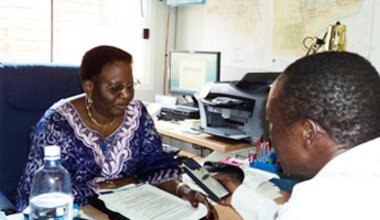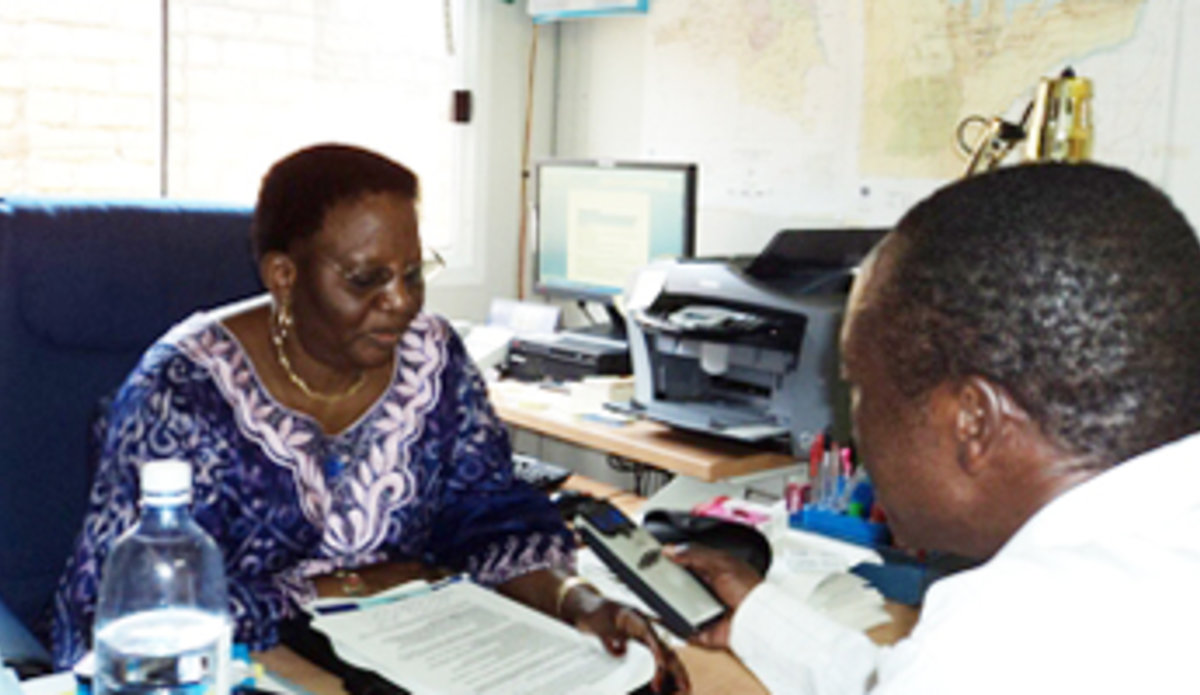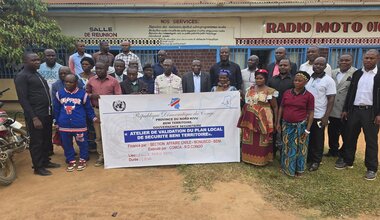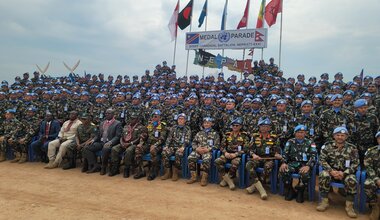MONUSCO encourages women to participate in DRC’s 2011, 2012 and 2013 elections

Photo: Tahina Andriamamonjitianasoa/MONUSCO
"How to encourage women candidates to take part in the upcoming elections." Such was the starting point of the latest bi-monthly consultation meeting between political parties and the United Nations Stabilization Mission in the Democratic Republic of Congo, (MONUSCO) in South Kivu.
The meeting took place on Monday, 22 August 2011, in Bukavu, the provincial capital of Sud Kivu. Ms. Asseta Ouédraogo, Gender Officer of the UN Mission, spoke to Radio Okapi journalist, Michel Cirimwami. She gave her views on the role women played in the 2006 elections, and the challenges that they are facing today, and outlined some strategies to encourage them to take part massively in the coming elections.
Q: You were recently at a meeting on women's participation in the upcoming elections. What was the objective of the meeting?
Asseta Ouedraogo: There is a framework for permanent consultations between the UN Mission and the different political parties in Sud-Kivu Province. The theme for this forum was: "Women's Participation in Political Activities: Prospects for the 2011 Elections and Women's Participation." It is against this background that I am here to present the results of a work that the Gender Unit did in 2007 following the 2006 elections. The meeting was attended by a majority of stakeholders who participated in the 2006 elections, including voters, women candidates and non-candidates. The objective of the forum was to help women prepare for the upcoming elections. The Sud-Kivu forum was a good opportunity to present the outcome of the consultations to the political leaders and bring them to reflect on appropriate strategies for an effective integration of women into their political parties, not just as voters, as usual, but also as candidates.
Q: During these consultations, you made a presentation focusing on the theme: "Prospects of Women Candidates, and their Role in the Country's Political Affairs: Gearing up for the 2011 Elections". What was the main thrust of your message?
Mme. A. O.: It is worth noting that things were presented from a women's perspective. I focused on the challenges faced by women candidates when running for elections, and then I made concrete suggestions and brought leaders of political parties to reflect on this issue. As you may be aware, my presentation brought into sharp focus the legal challenges facing women, and proposed a conventional framework that takes into account the international legal texts such as Resolution 1325, the Beijing platform and the African Union's pledge in this regard.
We then identified some strengths and weaknesses in the constitution. On the positive side, I pointed out the gender parity, which the constitution guarantees to all citizens, and on the negative side, I mentioned Article 13 of the electoral law, which exempts political parties from reaching gender parity. This issue should, therefore be addressed. We also highlighted the social and cultural barriers confronted by women during the elections in 2006. The context was that the country was emerging from a protracted civil war leaving its mark on the women who were victims of all sorts of violence including sexual violence, physical violence, traumatic situations, etc. As a result, they focused their attention on achieving peace more than anything else. We also highlighted women's inability to organize election campaigns due to financial constraints. The combination of all these factors explains why women did not participate massively. Therefore, we urged leaders of political parties to seriously look at all these aspects, for there is no democracy if women are excluded from political affairs. Women account for over 52% of the population. It would, therefore, be a serious mistake to ignore this fact since they represent a real force. Failing to look at the reality, would equate to a deliberate choice to ignore their needs and aspirations. A genuine democracy requires women's participation. We must integrate them into politics. It is an obligation, not an option.
Q: I understand you have opted for an encouraging approach in dealing with political parties; do you believe in their goodwill to take into account the gender issue within the context of the upcoming elections?
A.O: Through their different inputs, we could note some adherence to the concept that there is no true democracy without women's participation. Since the problem was raised, we had to find appropriate methodology to address it. I also told them their role was to sensitize and train the population. To this end, they need to come up with a clear policy on the gender issue, explaining how they intend to integrate women. Political parties must have a clear policy and strategy. So far, they have been carrying out sporadic activities for women's integration, without much achievement. They must put their heads together, taking into account women's perspective by developing a clear policy that should bring women to participate massively, to get registered, and to strengthen their capacity.
Q: Are you optimistic, and how do you assess Congolese women's participation in the political life, especially in eastern DRC?
A.O: I believe there are good reasons to be optimistic; when considering the results of the 2006 elections, one would note a poor representation of women, but we learned some good lessons from that. It is a learning process for women. They learned something from the 40 years plus, since independence, without partaking in the electoral process; it has been difficult for them to be on the sidelines of political affairs. But, they threw themselves into the battle; they are learning how to swim, how to keep their heads above water, and I must say that they are getting there. I concede that the issue of women's participation cannot be solved overnight. But, listening to them and the political parties, there is a real change taking place. Political leaders now have a positive approach towards women's participation, and I am positive that things will continue to improve.
Q: You were asked many questions in the workshop by women, some of whom being interested in your personal experience over the years from the different countries where you have served, and based on this rich past, what specific strategies do you have in mind for an increased participation of the Congolese woman in the electoral process?
A.O: Before I respond, I would like to underscore the fact that there are no fit-for all types of solutions for all countries; each country has its own contexts, identity, as well as its own people. Having said that, I would like to give some examples like in Burundi, where I served with UNIFEM [United Nations Development Fund for Women]. In this country, women organized themselves well ahead of the elections, and requested that the constitution be reviewed. Their strategy stemmed from the transitional constitution. Based on this legal text, they identified areas that were not in sync with gender parity, or the 30% quota requirement for women representation. From these areas, and under the leadership of the Women's Association of Jurists, they proposed some amendments to the constitution. After completing this preliminary phase of their work, they formed a platform to analyze the different inputs made, and met with the different political parties to discuss their proposals.
Then a follow-up committee was set up to implement the resolutions in relation to the 30% quota. I will also mention Rwanda's experience where specific mechanisms were put in place for women's integration and participation in the National Assembly. The approach helped Rwanda reach a 45% record high level of women's participation in the country's National Assembly. I may yet again mention the experience with Cameroon where support groups for women's participation in the political life were set up. Another one is right here in the DRC, where female associations such as the "Permanent Consultative Framework for the Congolese Woman" (known by its French acronym of CAFCO), was to interact with political parties. However, these efforts are just one step in the process. For the long haul, women should, in collaboration with men, put in place a monitoring mechanism to ensure the full implementation of these measures. I believe these experiences can be shared across borders, but I would like to stress that it is the responsibility of each country to come up with its own strategies and mechanisms based on its own context and realities (...)
Interviewed by Michel Cirimwami/ Radio Okapi/MONUSCO
 UN
UN United Nations Peacekeeping
United Nations Peacekeeping





